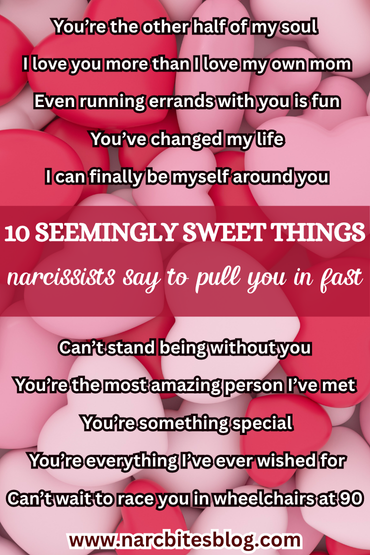Have you ever felt like you were falling into something so beautiful, so intense, that it almost didn’t feel real? And yet, you didn’t want it to stop. It was like a wave of warmth, attention, and electricity pulling you under – not violently, but seductively. If this sounds familiar, you may have experienced something known as love bombing.
What Is Love Bombing, Really?
Love bombing is not just a quirky phrase or a pop psychology buzzword. It’s a manipulation tactic used to overwhelm you with affection, attention, and validation. Narcissists use it—consciously or as a reflexive relational pattern—to bypass your defenses, disarm your instincts, and flood your brain with reward chemicals before you even know what’s happening.
When you’re on the receiving end, it doesn’t feel like a trap. It feels like a miracle. Finally, someone who sees you. Someone who listens. Who texts back. Who plans dates. Who remembers what kind of tea you drink and exactly how you laugh. Someone who wants you so intensely, you wonder if maybe, just maybe, this is what real love was supposed to be all along.
And because of that intensity, it becomes incredibly hard to question anything. You feel chosen. Special. Seen in a way you didn’t even know you needed. And that’s the hook.
The Brain Chemistry Behind the Bond
But here’s what your brain is doing in the background: it’s releasing a cocktail of feel-good chemicals like dopamine, oxytocin, and serotonin. Dopamine, especially, spikes with novelty and reward. The narcissist creates a feedback loop of unpredictable but powerful emotional highs – and your brain responds like it’s winning the jackpot. Again and again.
Oxytocin, the “bonding hormone,” deepens the attachment, while dips in serotonin levels can contribute to obsessive thoughts and emotional rumination. These shifts reinforce the pull toward the narcissist, especially when their affection is inconsistent. This isn’t romantic magic. It’s biochemical conditioning.
This is what makes love bombing so effective. It mimics the thrill of connection, intimacy, and belonging, but it’s designed to hook you emotionally before any real foundation is laid. You’re bonding with a fantasy. And the more you feel that high, the harder it becomes to notice the early warning signs.
Common Red Flags of Love Bombing
Let’s talk about those red flags. Because they’re there – just often buried beneath all the charm and grand gestures.
• “I love you” within days or a week – Instant intimacy is seductive, but true love takes time.
• Talking about marriage, soulmates, or moving in together too early – It creates a false sense of destiny.
• Constant texting and quick irritation if you don’t respond – Cloaked as passion, it’s actually control.
• Lavish or frequent gifts that create a sense of indebtedness – You feel obligated to reciprocate.
• Over-sharing personal details or prompting you to do the same – Creates fast emotional intimacy without trust.
• Immediate push for exclusivity – You’re flattered, but your autonomy shrinks.
• Claiming you were “meant to be” or “the one” almost instantly – It erases healthy skepticism.
• Intense flattery that feels more like a sales pitch than sincere affection – You’re being sold an image, not accepted as you are.
These aren’t signs of deep connection. They’re emotional overinvestment on a fabricated timeline. And that’s a tactic, not tenderness.
Another subtle red flag?
The speed with which you’re integrated into their world. Meeting friends and family early. Planning trips after one date. It feels validating, but it skips the natural rhythm of connection. It’s like they’re casting you in a role you haven’t auditioned for.
Red flags can also appear as sudden mood shifts. If they go from adoring to distant with no warning—and then blame you for the change—you’re likely being emotionally conditioned to seek their approval even harder. That unpredictability becomes part of the bond.
And don’t overlook the way they talk about exes. If every former partner was “crazy,” “toxic,” or “didn’t appreciate them,” it’s a preview of how you’ll be described when the mask slips. This isn’t harmless venting—it’s character assassination wrapped in faux vulnerability.
You may also feel like things are happening too fast to keep up. You’re overwhelmed, not just by attention, but by the speed and scale of emotional engagement. That overwhelming feeling is not love—it’s pressure disguised as passion. And it’s designed to keep you too dazzled to think clearly.
Why It Works: The Psychology of Vulnerability
It works best when you’re vulnerable.
People often ask, “Why did I fall for it? Why didn’t I see it?” The answer lies in your humanity. If you were going through a breakup, grieving, isolated, or questioning your self-worth, love bombing lands like medicine. It promises healing, attention, certainty. It fills the cracks.
The narcissist isn’t giving you love. They’re observing. They’re learning what makes you tick. What you crave. What you need to hear. They tailor their behavior—sometimes consciously, often unconsciously—to your emotional blueprint. And that’s why it feels so right. It wasn’t your weakness. It was your openness. Your hope. Your desire to connect. Those things were never flaws. But in the wrong hands, they made you easier to control.
Who’s Most Vulnerable to Love Bombing?
Narcissists are often highly skilled at spotting emotional availability and twisting it into dependence. If you’ve been raised in a family where love was inconsistent or had to be earned, love bombing can feel eerily familiar. It mimics those early emotional patterns: high highs, followed by confusing withdrawal. You subconsciously interpret the inconsistency as normal. Or worse, as something you must work harder to fix.
This blend of familiarity and intensity creates a uniquely powerful pull. It doesn’t feel like manipulation—it feels like fate. But that sensation is constructed. It’s a narrative built on your deepest emotional blueprints, not genuine connection.
Love Bombing as Emotional Conditioning
There’s also a neurological layer to all this. The brain doesn’t just respond to love bombing in the moment – it begins to anticipate it. This is what behavioral psychologists refer to as intermittent reinforcement. When validation and affection come in intermittent waves, the brain becomes conditioned to seek the high. You end up craving the reward, even as it becomes less frequent.
And once the love bombing ends, your brain enters withdrawal. The compliments stop. The messages get colder. And you, unknowingly, start trying to win back the euphoria. You replay memories. You rationalize. You self-blame. “Maybe I misread things. Maybe I’m too much. Maybe if I prove how loyal I am, they’ll return to who they were.”But who they were wasn’t real.
That version of them – attentive, gentle, enchanted by you – that was the bait. The real person emerges later: inconsistent, critical, dismissive. And by then, you’re often so emotionally entangled that leaving feels like tearing off a part of yourself.It’s important to understand: love bombing isn’t just flattery on steroids. It’s emotional conditioning. It sets up the perfect storm for future abuse: you become neurologically wired to chase the original high while accepting increasingly painful lows.
You’re not imagining things. You’re responding exactly as the conditioning intended.
What It Looks Like When the Mask Slips
You may find yourself replaying their good moments to override their bad ones. That’s no accident. Narcissists count on your empathy, your emotional memory, your belief in redemption. They weaponize hope.
You might also notice how their affection becomes a performance, especially in public or on social media. Everything is curated to show how perfect things are – and you feel pressure to live up to that image.
And then, they start to correct you. Slight criticisms dressed up as concern.
• “You’re too sensitive.”
• “You take things the wrong way.”
• “You’re imagining problems.”
These are not random remarks. They’re the beginning of the next phase: devaluation.
They may also isolate you subtly – discouraging you from talking to friends who “don’t understand what we have.” Or they may seem jealous of your time and energy spent elsewhere.
Eventually, the attention you once received is used against you: “You liked it when I did that before – now you’re ungrateful.”
This is where many victims begin to doubt their own emotional compass.
Gaslighting often sneaks in here—subtle denials of things you know happened. Confusion becomes your baseline. You begin to second-guess everything: not just them, but yourself. This erosion of your inner reality is deliberate. It replaces your internal world with theirs.
Love bombing isn’t a compliment—it’s a calculated setup.
It may feel euphoric at first, but underneath the flattery is a strategy. The goal is control, not connection. The affection is a tactic, not a truth.
It’s completely normal to feel confused.
This thought journal helps you see clearly again what really happened to you.
Narcissistic abuse teaches you
to question your own reality…



